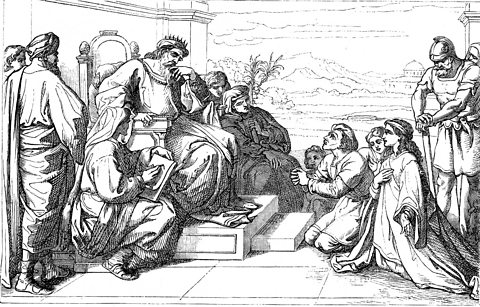The parable of the unforgiving servant
The parable of the unforgiving servant (Matthew 18:21-35)
Peter had a question for Jesus about forgiveness, āLord, how many times shall I forgive my brother when he sins against me? Up to seven times?ā Jesus answered, āI tell you, not seven times, but seventy seven times.ā He told the parable to explain.
A man owed the king ten thousand talentsA unit of currency used in the Roman Empire.. He could not pay so he begged for mercy ā and the king cancelled the debt. The man then met a fellow servant who owed him a hundred denariiPlural of denarius which were coins used throughout the Roman Empire.. The man demanded payment and had his fellow servant thrown in prison when he could not pay.
When the king heard about this, he called for the first servant. āYou wicked servant,ā he said, āI cancelled all that debt of yours because you begged me to. Shouldnāt you have had mercy on your fellow servant just as I had on you?ā The king handed him over to the jailers to be tortured.
Jesus concluded, āThis is how my heavenly father will treat each of you unless you forgive your brother from your heart.ā

Background
A parable is a story with a meaning. Why did Jesus often use parables in his teaching?
- Jesus kept his teaching varied and interesting. Telling a story is a good way to do this. It is also a good way to get peopleās attention.
- Parables presented a challenge. Sometimes the meaning was hidden and people had to work this out for themselves.
- Some of the people Jesus taught were not particularly well educated and a parable could help people to understand his teaching.
- Through parables Jesus could use illustrations from everyday life that his listeners could relate to, like farming or fishing.
Understanding the text
Peter had a question for Jesus about forgiveness, āLord, how many times shall I forgive my brother when he sins against me? Up to seven times?ā
The Jewish leaders taught that a person should forgive someone else three times. Peter probably thought he was being very generous by saying seven. It is not clear whether Jesus said āSeventy times sevenā or āSeventy seven timesā, but his meaning is clear - forgiveness should be without limit.
Jesus then told the parable to illustrate some important points about forgiveness.
- The first servant owed his master an enormous sum of money. Ten thousand was the largest Greek number and a talent was the largest coin. This would be the equivalent of millions of pounds today. This debt could never be repaid, yet his master forgave him. We should always forgive, even if the debt is huge.
- The master in the story is like God. If a person is genuinely sorry for wrong doing and asks for Godās forgiveness, it is freely given.
- The second servantās debt was very small, yet the first servant would not let him off. This is the wrong attitude. Jesus taught that God is willing to let us off a debt we cannot repay, so we should be ready to forgive others.
- The servant who did not forgive was tortured. Perhaps Jesus is referring to the way a person feels when they cannot forgive. They remain bitter and resentful and end up suffering the most.